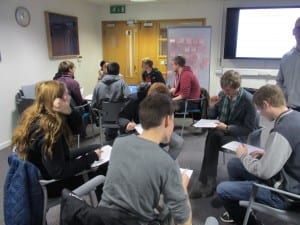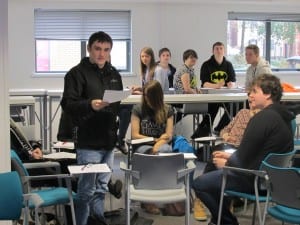 Earlier this year University of Lincoln students on the first year politics module Who Runs Britain? submitted evidence to a parliamentary select committee inquiry on constitutional reform. The inquiry by the Political and Constitutional Reform Committee was launched shortly after the 2010 general election to look into arguments for and against the adoption of a written, or codified, constitution for the United Kingdom.
Earlier this year University of Lincoln students on the first year politics module Who Runs Britain? submitted evidence to a parliamentary select committee inquiry on constitutional reform. The inquiry by the Political and Constitutional Reform Committee was launched shortly after the 2010 general election to look into arguments for and against the adoption of a written, or codified, constitution for the United Kingdom.
The committee published a report in July 2014 entitled A New Magna Carta? in which they set out the arguments for and against codification and provided a blueprint for constitutional change based on three alternative approaches: a constitutional code (a non-legal document setting out the current arrangements); a constitutional consolidation act (a new legislation to bring together existing laws); and a written constitution (a new legal and binding written constitutions for the UK). The committee examined what each of these options might mean in relation to ten key themes: the Head of State; the Prime Minister; elections; ministerial conduct; the House of Lords; the judiciary; human rights; devolution; local government; and the European Union. The report also considered the process by which a constitution would be drafted.
To coincide with the publication of A New Magna Carta? the committee launched a public consultation in which views were sought on the overall question of a written constitution and the three alternative models. In an admirable attempt to involve the public in the parliamentary process the committee sought to elicit views from as wide a range of individuals and groups as possible by producing a short video introduction by the committee Chair, providing advice for schools and universities on giving evidence and running a competition to draft a preamble to a written constitution for the UK.
The ten main themes identified by the committee mapped closely onto the topics covered in the first term of the Who Runs Britain? module, which begins in September with the UK constitution, examines the principal institutions and actors in the British political process the executive, parliament, the judiciary etc. and concludes in December with local government.
However, collating and presenting the views of over fifty undergraduate students, many of whom had not previously studied British politics, was no easy task. A variety of strategies were deployed for capturing views. Students were polled early in the module, and then again towards the end of term, on where they stood on the broad question of whether Britain should adopt a written constitution. A series of workshops were held in order to facilitate more detailed discussion around the proposals included in the committee’s report and to discuss various drafts of our submission. Three workshops in particular focused on: responses to the broad question of whether Britain should adopt a codified or written constitution; examining the ten main themes identified in the committee’s report; and the process of drafting a new constitutional document.
 The key themes were introduced in lectures and the workshops were facilitated by myself and my colleague, Dr Ben Kisby. We provided summaries of the committee’s proposals, background information on the key issues, and guided discussion where necessary. We also drafted the submission. However, the views presented in the submission were entirely those of the students involved, and often did not reflect those of their tutors. At each stage drafts of the submission were circulated and amended on the advice of the students who were quick to point out if the draft was too forceful in making a point or sought to present consensus were there was none. Indeed, it soon became clear that while our tendency in drafting the submission was to seek to present a single coherent and consensual narrative, the students were much more keen to ensure that as diverse a range of views as possible were represented.
The key themes were introduced in lectures and the workshops were facilitated by myself and my colleague, Dr Ben Kisby. We provided summaries of the committee’s proposals, background information on the key issues, and guided discussion where necessary. We also drafted the submission. However, the views presented in the submission were entirely those of the students involved, and often did not reflect those of their tutors. At each stage drafts of the submission were circulated and amended on the advice of the students who were quick to point out if the draft was too forceful in making a point or sought to present consensus were there was none. Indeed, it soon became clear that while our tendency in drafting the submission was to seek to present a single coherent and consensual narrative, the students were much more keen to ensure that as diverse a range of views as possible were represented.
The submission can be read in full here. What was clear from the outset was that the overwhelming majority of the students were opposed to the idea of adopting a written constitution, believing that it was unnecessary, a waste of time or simply too difficult. However, when looking in more detail at the key themes, there was support for some codification in certain areas. For example, there was a feeling that the role of the Prime Minister should be more clearly defined, that the status of the Cabinet should be clarified and that the Ministerial code should be enshrined in law. There was also strong support for the view that certain rights, including social and economic rights, should be protected and not easily set aside by a simple majority vote in Parliament.
The Political and Constitutional Reform Committee published its response to the consultation just before Easter. This had been a wide-ranging and innovative consultation on the part of the committee which secured evidence from a more diverse range of participants than normally contribute to select committee inquiries, including individual experts, community groups, universities and schools. There were 161 written submissions of evidence. Lincoln was one of only seven universities whose students made joint submissions to the inquiry, alongside Hull, Manchester Metropolitan, Greenwich, Northumbria, Liverpool and Canterbury Christ Church. In total around 500 students contributed to joint submissions from their departments.
Although the committee’s response did not refer specifically to any of the proposals in our submission, that is the nature of submitting evidence to select committee, the submission was referred to in the report in the context of describing the consultation process. The submission has also been published on the committee’s website. Moreover, the content of our submission was clearly reflected in the committee’s response. In particular the committee gives due prominence to those, like our students, who in general argued against the adoption of a written constitution. For example, in summarising responses it states in paras 32 & 33:
There was a general welcome for the Committee’s exercise… Nevertheless, a number of responses did criticise the premise of the exercise and the necessity of any kind of constitutional codification, praising the flexibility of present constitutional arrangements and arguing that there was no need for change or codification.
Similarly it observed:
We also received submissions arguing that a “constitutional moment” has not been reached, or that political conditions were not right for the introduction of a new constitutional settlement.
And that:
…submissions against codification in general, and a written constitution in particular, argued that the present system was sufficiently flexible and that any form of written constitution would hamper swift and efficient change to the constitution where this was deemed necessary.
The committee’s response also included a draft or ‘pocket constitution’ which reflected some of the more substantive recommendations in our proposal including: that there should be codification of some of the powers of the Prime Minister; that the House of Lords should be significantly smaller; that a single consolidated local government act might more clearly define the powers and functions of local government; and that rights, including social and economic rights, should be entrenched in law.
This was a most valuable process both on the part of the committee and our students who, in their first term at university, worked hard to contribute to a national debate on an issue of national importance. Despite the fact that many of them felt the preferred option was the status quo, they engaged enthusiastically with the process, and welcomed the opportunity to contribute to a parliamentary inquiry. Indeed, while the majority of students were sceptical about the need for a written constitution, due in part to the difficulties of arriving at a national consensus about what it might include, they nevertheless recognised that this consultation and the process whereby we debated it at Lincoln, at least in part showed the potential for broad and inclusive debate on important and complex issues relating to our democracy. For my part, although I have considerable experience of engaging with Parliament, this was the first time I have contributed to a select committee inquiry alongside my students, but I am sure it will not be the last.
